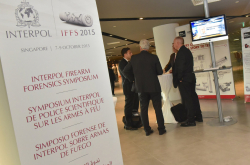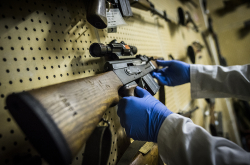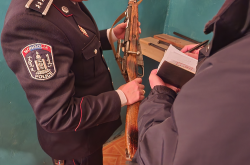LYON, France – Ballistic experts, forensic scientists, law enforcement professionals, policy makers and public safety officials are gathering virtually this week to focus on preventive crime and gun strategies.
The 5th INTERPOL Firearm Forensics Symposium (4-6 May), organized in cooperation with Ultra Electronics Forensic Technology, will see nearly 500 participants from 100 countries address the latest challenges facing law enforcement in firearm related crime.
Through interactive sessions, participants will explore the fundamental processes and technologies required for a successful firearms programme, including:
- Building sustainable crime-gun strategies;
- The benefits of using multiple technologies to gather, intercept, trace, and compare illicit firearms material;
- Understanding offenders and how they interact;
- Using INTERPOL as a central intelligence hub for firearms-related crime, including its Ballistic Information Network (IBIN).
Opening the symposium, Cyril Gout, INTERPOL’s Director of Operational Support and Analysis, said: “Each firearm, each cartridge case and each bullet can become the precious asset that generates investigative leads in cases that would otherwise go undetected.”
Earlier this year, Operation Trigger VI highlighted the value of gathering and sharing firearms information, with 4,000 arrests and nearly 10,000 checks against INTERPOL databases to track illegal firearms and identify potential links with organized crime.
Alvaro Venegas, President of Ultra Electronics said: “This symposium and IBIN are tangible examples of collaboration between two organizations that share a common purpose: fostering the cooperation and sharing of information between agencies in order to educate and to promote more effective gun crime prevention strategies.”
At the heart of the global response to gun crime are INTERPOL’s Illicit Arms Records and Tracing Management System (iARMS) to search and trace lost, stolen and smuggled or trafficked firearms and the IBIN, which currently connects 36 countries. IBIN also is a key pillar in the INTERPOL Firearms Recovery Protocol, guidelines that assists law enforcement with identifying firearms traffickers.







